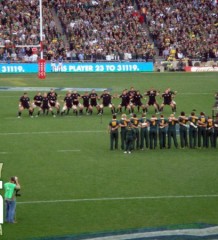Latest law amendments to be trialled in South Africa
Domestic rugby in South Africa will fall in line with the northern hemisphere when the recently-announced law amendments will also go on trial locally in six competitions, following special dispensation from World Rugby.
These amendments, which focus heavily on the refereeing of scrums and the tackle/ruck area, will be trialed in the Currie Cup (Premier and First Divisions), SA Rugby Under-21, -20 and -19 Championships as well as Pro14. They will come into effect from this weekend onwards.
CLICK HERE TO VIEW THE FULL PACKAGE OF GLOBAL LAW TRIALS (ENG) >>
The Castle Lager Rugby Challenge will not be affected by the changes, but the November 2017 Tests will operate under the full global law trials.
The six aspects of law approved to join the global trial program are:
- Law 20.5 and 20.5 (d) Throwing the ball into the scrum
No signal from the referee. The scrum-half must throw the ball in straight but is allowed to align their shoulder on the middle line of the scrum, therefore allowing them to stand a shoulder width towards their own side of the middle line.
Rationale: To promote scrum stability, a fair contest for possession while also giving the advantage to the team throwing in (non-offending team).
- Law 20.9 (b) Handling in the scrum – exception
The number eight shall be allowed to pick the ball from the feet of the second-rows.
Rationale: To promote continuity.
- Law 20 Striking after the throw-in
Once the ball touches the ground in the tunnel, any front-row player may use either foot to try to win possession of the ball. One player from the team who put the ball in must strike for the ball.
Sanction: Free-kick
Rationale: To promote a fair contest for possession.
- Law 15.4 (c)
The tackler must get up before playing the ball and then can only play from their own side of the tackle “gate”.
Rationale: To make the tackle/ruck simpler for players and referees and more consistent with the rest of that law.
- Law 16 Ruck
A ruck commences when at least one player is on their feet and over the ball which is on the ground (tackled player, tackle). At this point, the offside lines are created. Players on their feet may use their hands to pick up the ball as long as this is immediate. As soon as an opposition player arrives, no hands can be used.
Rationale: To make the ruck simpler for players and referees.
- Law 16.4: Other ruck offenses
A player must not kick the ball out of a ruck. The player can only hook it in a backward motion.
Sanction: Penalty
Rationale: To promote the player welfare and to make it consistent with scrum law.
The six new aspects of the law were part of the original 2015 laws review process and were recommended to move to closed trial to provide a further analysis opportunity before the global trial could be considered.
These closed trials were operational at the 2017 World Rugby U20 Championship, World Rugby Nations Cup, World Rugby Pacific Challenge, Americas Rugby Championship and Oceania Rugby U20 Championship, with positive outcomes:
Scrum outcomes:
- More ball coming back into play with fewer penalties and fewer collapses
- The ball was fed quicker with scrums continuing to be stable prior to put-in
- No collapses occurred by the number eight picking the ball up from under the second rows
Tackle outcomes:
- Feedback suggested that the tackle was easier to referee with clearly defined offside lines and tacklers not interfering with the quality of the ball with more players on their feet allowing counter rucking
A comprehensive analysis was undertaken by the specialist Laws Review Group, the Scrum Steering Group, considering detailed and highly-positive union, player and match official feedback, before the recommendations were approved by the Rugby Committee and subsequently the Executive Committee. The trials were also considered at the high performance match officials and coaches meeting earlier this year.
Implementation this year will enable at least a year of evaluation before the moratorium on law amendment begins a year out from Rugby World Cup 2019.
Issued by SA Rugby Communications
Related Posts
« Michael Hooper appointed Wallabies captain Golden tickets for Tygerberg, Swallows »



















